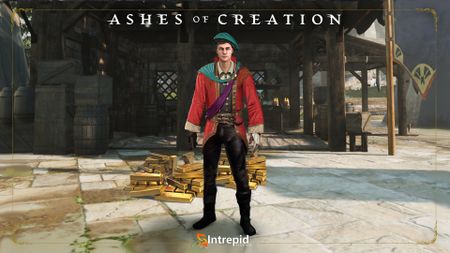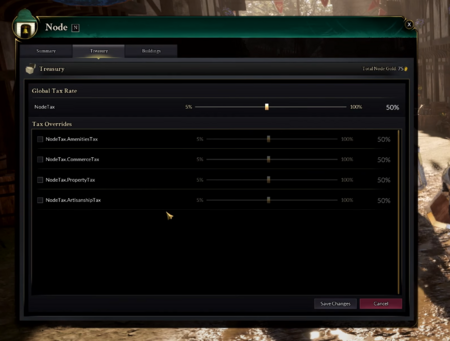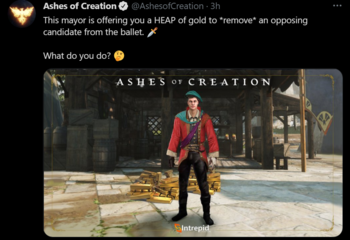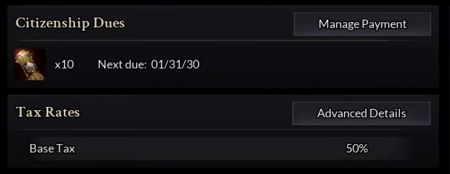Node treasury

These are node commodities and they're the resources the node uses for lots of things like siege defense, they're going to use it for maintenance, they're going to use it to build buildings, they're going to trade it with other nodes.[1] – Chris Justo
A node's treasury accumulates funds and commodities that can be utilized for node-related actions initiated by the Mayor.[1][2][3][4][5][6][7]
- Treasury funds are accumulated via node taxes.[1][8]
- Node commodities are accumulated via buy orders.[1][2][3][4]
- Treasury money may only be used to fund node-related development.[9]
Buy orders

Buy orders are instrumental in the activities that a node participates in.[10] – Steven Sharif

We're gonna build a Forge today, or a Smithy- we renamed it: it's not a forge anymore- and we need bins of stone for it.[11] – Chris Justo
Buy orders are the primary way for a node to generate node commodities that can be spent on construction, upgrades, and maintenance of node service buildings.[3][2]
- Mayors initiate buy orders using gold from the node treasury.[3][2][6] The mayor can adjust the parameters of buy orders:
- How many commodities are being requested.[3][2]
- How long the buy order is active.[3][2]
- The raw materials or crafting materials required to complete the buy order.[12][3][2] Final goods are not used to complete buy orders.[12]
- How much players are rewarded.[3][2]
- When selecting specific types of buy orders that require certain material components in order to fulfill, you will have a wide array of material choices to make: either those that are relevant locale to your node placement or those that are across the world; and there is a variable in payment that the mayor has access to in setting and how they'll be rewarding players. So you need to make sure that you're incentivizing players who are making those large transits across the world to actually take that risk and bring those materials to you.[13] – Steven Sharif
- Players are rewarded with bound node currency and node reputation for fulfilling buy orders.[10][3][2]
- Once a material gets sunk into the buy order, the player receives the benefit of the node currency, which right now is a bound currency that's used to purchase a number of different types of vendorable items that exist within nodes.[10] – Steven Sharif
- If a mayor does not create buy orders, they will auto-populate after a set period of time based on node activities.[14]
- If the mayor is not making these decisions, buy orders will populate based off of activities that the node have available to them after a set period of time. So that the bad faith mayor is not depleting the node potentially of its resources that players can still interact with.[14] – Steven Sharif
- Node citizens participating in buy orders will generate mandates for their node.[15]
- Players will be able to view buy orders that are listed at nodes around the world.[16]
- Those of you who are traders and are interested in actually capitalizing on the supply and demand of nodes and their competing interests and what they're trying to accomplish will have an opportunity to move those goods around the world: Take that risk potentially, but receive a high reward as a result.[16] – Steven Sharif
- Buy orders are distinct from mayoral commissions.[17]
- A buy order is strictly material-based and you don't accept a buy order and then go do it. It is something that you can just check your node UI or you can check the nodes around you to see what they have active and you can just go do it and come back; and participate or fulfill these buy orders. Whereas, a commission is- a mayoral commission is more like a quest. It's something you pick up and then it tracks your activity while you have it.[17] – Chris Justo
Mayors

Mayors have a unique ability to elicit change within the node proper, either through the destruction of certain buildings that have been constructed previously, because there's a limited number of slots that buildings can be constructed within, or the kickoff of additional projects, or the certain types of policies that can be enacted, like... the changing of a tax rate. They all have a unified source of energy requirement and the energy requirement is a mandate.[19] – Steven Sharif
Mayors are chosen through different election methods according to the node's type.[20][21]
- Only node citizens may be elected mayor.[22]
- Previous mayors won't have any special system driven bonuses to help them get reelected.[24]
- Kings and Queens can also become a mayors.[22]
- Mayoral leadership powers are granted via the use of mandates.[19][25]
- Players will be able to view a historical listing of mayors of a node.[26]
Node taxes

As the node levels up, you're gonna get access to deeper controls on the taxes, so that you as a Mayor can incentivize players to come to your node to do certain things. If you're a node that loves smithing, you're probably going to want to lower your taxes on artisanship to incentivize players to be here. But then you might want to drive up taxes on other avenues that players aren't necessarily coming to your node for, but are using out of convenience.[27] – Chris Justo
Mayors are able to set a generalized node tax rate as well as overrides for different activities within their node. Mayors gain additional taxation controls as their node advances.[27][8]
- Amenities tax override.[27]
- Artisanship tax override.[27]
- Commerce tax override.[27]
- This may include taxes that apply to tavern games.[28][29]
- Property tax override.[27]
- Freehold property taxes scale according to the number of freehold building permits issued for that freehold.[30][31][9]
- Citizenship dues and property taxes scale based on the stage of the node when a player became a citizen.[3][32][33][34][35]
- The goal is to exert financial pressure on node populations by making taxes increasingly expensive as nodes advance, rather than putting in place hard population caps.[33][34]
- Node tax rates will be visible on the world map by hovering over a node location.[36]
- Tax revenue only goes toward funding node development. This cannot be withdrawn by the mayor or any other player.[37][9]
Regent nodes take a cut of taxes from various activities that occur within their vassal node structure.[37][38]
- This tax doesn't necessarily impact the individual citizen, because citizen's tax levels are determined by their node, but the node's finances are affected by the taxation levied by its parent nodes.[38]
Housing taxes
When a node reaches stage 3 (Village) and a player run government has formed, all player housing will pay taxes.[39]
- A player's tax charge will be determined by the number of structures built on their plot.[31][9]
- Freehold taxes are calculated based on the number of permits issued for buildings on a freehold.[40][41][30][31][9]
- Buildings that require permits will have additional upkeep costs.[40]
- Maintaining businesses requires licensing and payments to the node your Freehold is associated with. This permitting system allows for a certain number of buildings to be constructed on a Freehold. Permits can be obtained from the same node the Freehold was certified from, and buildings that require permits will have an additional upkeep cost.[40]
- Housing foreclosures result from failing to pay property taxes or other fees.[40]
Visuals
See also
References
- ↑ 1.0 1.1 1.2 1.3 1.4 Video, August 31, 2023 (4:01).
- ↑ 2.0 2.1 2.2 2.3 2.4 2.5 2.6 2.7 2.8 Livestream, August 31, 2023 (59:43).
- ↑ 3.00 3.01 3.02 3.03 3.04 3.05 3.06 3.07 3.08 3.09 3.10 Blog: Development Update with Village Node.
- ↑ 4.0 4.1 4.2 Livestream, August 31, 2023 (50:25).
- ↑ Livestream, April 29, 2022 (27:42).
- ↑ 6.0 6.1 Interview, July 8, 2020 (1:04:05).
- ↑ MMOGames interview, January 2017
- ↑ 8.0 8.1 Livestream, March 28, 2020 (1:03:38).
- ↑ 9.0 9.1 9.2 9.3 9.4

- ↑ 10.0 10.1 10.2 Livestream, August 31, 2023 (1:01:10).
- ↑ 11.0 11.1 Video, August 31, 2023 (5:04).
- ↑ 12.0 12.1 Livestream, August 31, 2023 (1:06:01).
- ↑ Livestream, August 31, 2023 (1:02:35).
- ↑ 14.0 14.1 Livestream, August 31, 2023 (1:02:23).
- ↑ Livestream, August 31, 2023 (1:04:00).
- ↑ 16.0 16.1 Video, August 31, 2023 (12:55).
- ↑ 17.0 17.1 Livestream, August 31, 2023 (1:04:14).
- ↑

- ↑ 19.0 19.1 Livestream, August 31, 2023 (31:44).
- ↑ Node series part II – the Metropolis.
- ↑ Blog - Know Your Nodes - The Basics.
- ↑ 22.0 22.1 22.2

- ↑ Interview, May 11, 2018 (50:05).
- ↑ Livestream, August 31, 2023 (37:35).
- ↑ Livestream, November 17, 2017 (9:49).
- ↑ Livestream, September 29, 2023 (1:05:44).
- ↑ 27.0 27.1 27.2 27.3 27.4 27.5 27.6 27.7 Video, August 31, 2023 (28:04).
- ↑

- ↑

- ↑ 30.0 30.1 Interview, July 9, 2023 (54:46).
- ↑ 31.0 31.1 31.2 Livestream, June 30, 2023 (1:45:22).
- ↑ Livestream, August 31, 2023 (15:51).
- ↑ 33.0 33.1 Interview, July 9, 2023 (38:14).
- ↑ 34.0 34.1 Interview, March 27, 2020 (0:30).
- ↑ Video, April 5, 2018 (41:48).
- ↑ Livestream, September 29, 2023 (1:11:22).
- ↑ 37.0 37.1 Livestream, August 26, 2022 (1:10:16).
- ↑ 38.0 38.1 Interview, May 11, 2018 (57:02).
- ↑

- ↑ 40.0 40.1 40.2 40.3 Blog: Exploring the Boundless Opportunities of Freeholds.
- ↑


